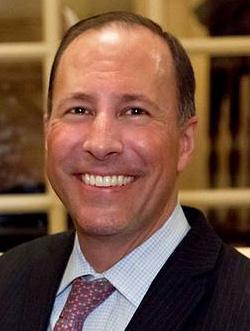
5 minute read
Washington Update
Nothing in Washington that is worth doing is easy, and tax reform is no exception. There is no doubt that our tax code needs a rewrite. As Congress’ Joint Committee on Taxation points out, since our last overhaul in 1986, our economy has nearly doubled in size, and the internet and globalization have fundamentally changed the way we do business. Today’s tax code fails to recognize these changes, puts us at a global competitive disadvantage (the combined state and federal U.S. corporate tax rate of more than 39 percent is two and three times higher than that of “competing” countries) and ultimately hinders job and economic growth. The good news is that leaders in the House, Senate and White House agree on the need for tax reform and are committed to its enactment. While that creates a solid foundation for this important effort, we all know it will take fortitude and persistence to change a tax code that now spans 74,000 pages. AmBA is strongly in favor of tax reform that strengthens economic growth and creates jobs. A stronger economy would be good for the country, our members, and their customers. We have made ourselves a resource to the lawmakers and staff who are at the center of this enormous undertaking, providing analysis and expertise. We also are encouraging bankers to raise this topic in meetings with their elected representatives. Of course, like others, we have strong opinions about specific provisions, like the deductibility of interest and the tax-favored status of bank competitors. But we also know that economic growth — which tax reform is intended to spur — is priority number one for our industry, and that any package put forward must be evaluated as a whole, based on its net impact on the economy, banks and bank customers. That is why we developed a set of core principles for tax reform that will serve as the basis for our comprehensive analysis of any package that emerges from the deliberations. Those principles, which are available in full on aba.com, urge policymakers to: Lower rates for all businesses substantially — 15 to 20 percent has been proposed — to boost growth and allow U.S. businesses to be competitive in the global market Broaden the base and simplify the tax code to level the playing field Specifically eliminate favored tax treatment enjoyed by credit unions and the Farm Credit System Consider carefully the effects of any potential effort to limit the deductibility of interest, which could adversely impact economic growth. (The extent of tax rate reductions will be a key factor in assessing the broader impact of any changes to the deductibility of interest.) Avoid industry-specific taxes, which would be punitive, unfair and slow economic growth Provide adequate transition time for the market and balance sheets to adjust to the new system AmBA developed these principles through an internal tax reform working group that has coordinated closely with AmBA’s bankerled Taxation Administrative Committee and solicited feedback from bankers in various forums. We have highlighted the principles in communications to Capitol Hill, informing members that we will strongly support tax reform efforts that align with these principles. Our goal is to encourage a smart approach to comprehensive tax reform that can help America’s communities thrive. As a veteran of the Treasury Department in the early 2000s when tax cuts were enacted, I know this undertaking is hard — I have the bruises to prove it. But that doesn’t mean it can’t be done. It can, and we should do everything in our power to make it happen. Tax Reform: A Hard Job Worth Doing

ROB NICHOLS President & CEO American Bankers Association
ABA Professional Development Webinars... Provide the option of training as many employees as you wish for one price, all from the convenient location of your home institution!
Building an Effective IT Audit Program Tuesday, October 3, 2017 10:00 a.m.- 12:00 p.m.
Seven Habits of Effective Credit Administration in Banks Tuesday, October 3, 2017 1:30 p.m.-3:30 p.m.
Legal Essentials for Lenders Wednesday, October 4, 2017 1:30 p.m.-3:30 p.m.
ARM Disclosures: Review & Update Wednesday, October 4, 2017 10:00 a.m.-12:00 p.m.
The ACH Audit & Risk Assessment: What You Need to Know Thursday, October 5, 2017 10:00 a.m.-12:00 p.m.
Internal Audit Thursday, October 5, 2017 1:30 p.m. – 3:30 p.m.
Legal Liabilities When Check Fraud Occurs Tuesday, October 10, 2017 1:30 p.m. – 3:30 p.m.
Understanding Regulation CC and the New Amendments Wednesday, October 11, 2017 1:30 p.m. – 3:30 p.m.
TRID Review and Update Wednesday, October 11, 2017 10:00 a.m.- 12:00 p.m. Key Ratio Analysis Thursday, October 12, 2017 9:00 a.m.- 3:00 p.m. HDMA 2018 Challengies with Taking Applications Part I Thurday, October 12 1:30 p.m.- 3:30 p.m.
Denials Thursday, October 12 10:00 a.m.-12:00 p.m.

Excel Explained: Filtering and Formatting Data Friday, October 13, 2017 10:00 a.m.- 12:00 p.m. UDAAP Risk Assessments Monday, October 23, 2017 1:30 p.m. – 3:30 p.m.
Advanced Financial Statement Analysis Monday, October 23, 2017 9:00 a.m.- 3:00 p.m.
Marketing & Advertising Compliance Tuesday, October 24, 2017 10:00 a.m.- 12:00 p.m.
Tech Fraud: A Virtual Minefield Wednesday, October 25, 2017 10:00 a.m. - 12:00 p.m.
Patch the People- Education for Customers and Employees Tuesday, October 17, 2017 10:00 a.m.-12:00 p.m.
Loan Documentation 101: Basic Secured Loan Documentation Wednesday, October 18, 2017 1:30 p.m.-3:30 p.m.
Customer Conflict: Opportunity Knocks Wednesday, October 18, 2017 10:00 a.m.-12:00 p.m.
Loan Documentation 101: Lien Perfection, Business Collateral Thursday, October 19, 2017 10:00 a.m.- 12:00 p.m.
FFIEC Information Security Handbook Review Friday, October 20, 2017 10:00 a.m.- 12:00 p.m. Compliance Perspectives: A Monthly Update Thursday, October 26, 2017 1:00 p.m. – 2:00 p.m.
Lending to Non-Profit Organization Friday, October 27, 2017 10:00 a.m.- 12:00 p.m.
Basic Personal & Business Tax Return Analysis Friday, October 27, 2017 9:00 a.m.- 3:00 p.m.
Contingent Liabilities: Three Lines of Defense Monday, October 30, 2017 1:30 p.m. - 3:30 p.m.
Introduction to Commercial Lending Monday, October 30, 2017 9:00 a.m.- 3:00 p.m.









